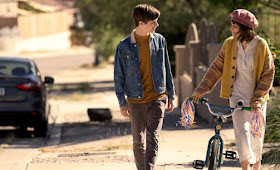Four stars. Rated PG, for no particular reason
By Derrick Bang • Originally published in The Davis Enterprise, 3.27.20
One can’t help being amazed by the synchronicity between Grace VanderWaal and Jerry Spinelli’s 2000 young adult novel.
The heroine of Spinelli’s deservedly popular best-seller is a cheerfully nonconformist high school girl who — among other quirks — brings a ukulele to school each day, in order to sing “Happy Birthday” to deserving classmates (whether or not they desire such attention).
Sixteen years later after that book’s debut, VanderWaal won American’s Got Talent at age 12 (!), by performing her original songs … accompanying herself on ukulele.
As far as I know, she never has claimed direct inspiration from Spinelli’s book … which makes her having been cast in the film adaptation, well, quite inspired.
The obvious question: Can she also act?
Oh, my, yes.
Director Julia Hart’s big-screen adaptation of Stargirl, available via the streaming service Disney+, is a tender coming-of-age saga: charming, poignant and bittersweet by turns. The screenplay — by Hart, Kristin Hahn and Jordan Horowitz — is faithful to the spirit and tone of Spinelli’s book, along with its core plot beats. That said, they’ve softened some of its harsher sequences, while bringing the story into the social media present (which, as we all know, can be brutal in its own way).
VanderWaal and co-star Graham Verchere, just two years older than she — and isn’t it nice, to see these characters played by age-appropriate actors? — are splendid on screen together. They’re natural, uncomplicated and unfussy: endearingly authentic as high school students, even given her character’s eccentric nature.
But that’s getting ahead of things. We’re introduced first to Leo Borlock (Verchere), who as a younger adolescent lost his father and — ever since — has cherished the absent parent’s whimsical porcupine necktie. In an effort to forge a new life for them, Leo’s mother (Darby Stanchfield) moves them to the serene desert community of Mica, Ariz.
Leo’s initial exposure to Mica High School cruelly demonstrates the folly of standing out from the crowd, and — during the next several years — he slides into quiet conformity. It’s easy to do at this school, where absolutely nothing happens. The football team never has won a game; the hallway trophy case displays nothing but spider webs; the school marching band — wherein Leo plays trumpet — is absolutely dreadful (wincingly so).
Hart and editors Shayar Bhansali and Tracey Wadmore-Smith economically sketch this back-story material in montage, while an off-camera Leo narrates his own saga (from something of a remove, we realize, which is telling).






